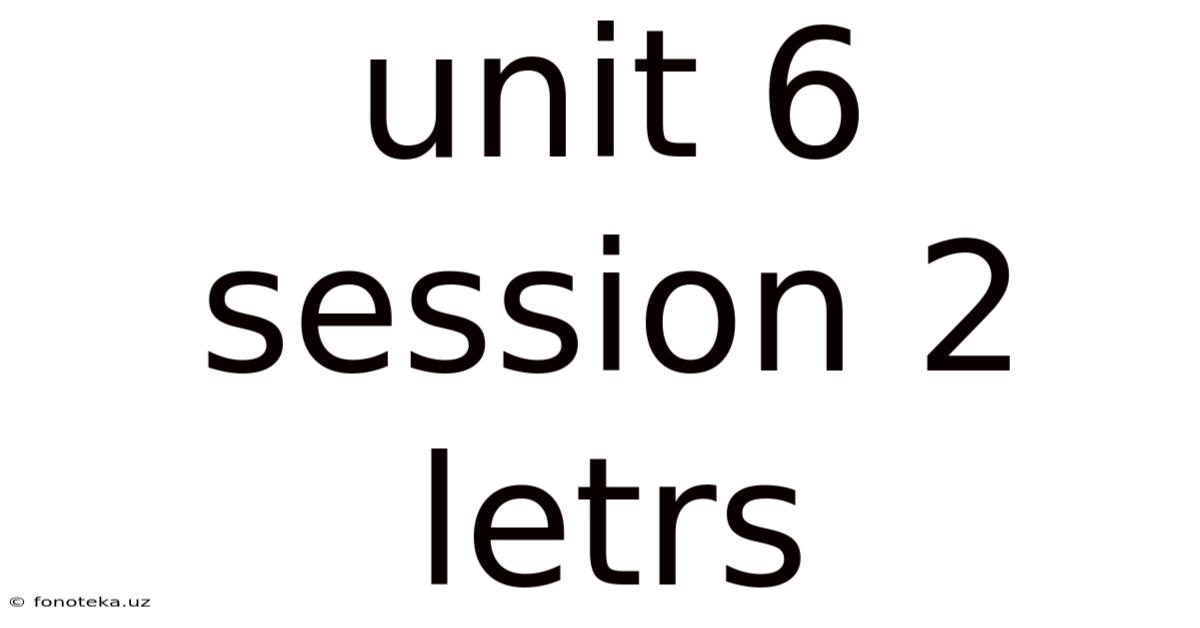Unit 6 Session 2 Letrs
fonoteka
Sep 22, 2025 · 4 min read

Table of Contents
I cannot find any publicly available information about a standardized educational curriculum or program called "Unit 6 Session 2 LETRS." LETRS (Language Essentials for Teachers of Reading and Spelling) is a well-known professional development program for educators, but the specific "Unit 6 Session 2" is not a universally recognized term. It's possible this refers to a specific internal curriculum or training used within a particular school district, institution, or online course.
To provide you with a helpful and comprehensive article, I need more context. Please provide more details, such as:
- The source of the "Unit 6 Session 2 LETRS" information: Where did you encounter this term? (e.g., a syllabus, a course website, a teacher's notes)
- The overall curriculum or program: What is the broader context of this unit? What is the focus of the overall LETRS program or course being discussed?
- Specific learning objectives: What are the specific skills or knowledge points covered in this unit?
Once I have this information, I can create a detailed article that addresses the content of "Unit 6 Session 2 LETRS," including explanations, examples, and potential activities. The article will follow the formatting and SEO guidelines you provided.
In the absence of specific details, I can offer a general overview of common topics covered in LETRS programs that might be included in a hypothetical "Unit 6 Session 2." These could include:
Possible Topics Covered in a Hypothetical LETRS Unit 6, Session 2
This section speculates on potential content, given the general focus of LETRS on comprehensive reading instruction. This is NOT a substitute for the actual content of any specific "Unit 6 Session 2 LETRS" curriculum.
Possible Focus Areas:
-
Advanced Phonics and Morphology: This could involve deeper dives into less common vowel combinations, complex consonant blends and digraphs, and the use of morphemic analysis to decode multisyllabic words. Examples might include exploring the relationship between prefixes, suffixes, and root words and how they impact meaning. Activities might involve analyzing word families, identifying morphemes, and building vocabulary through morphology.
-
Reading Fluency and Prosody: This session could focus on strategies for improving reading fluency, such as phrasing, intonation, and expression. The emphasis would likely be on how these prosodic elements contribute to comprehension and engagement. Activities could include modeling fluent reading, paired reading, and providing opportunities for students to practice reading aloud with appropriate expression.
-
Vocabulary Development and Academic Language: A significant portion of LETRS often covers vocabulary acquisition. This session might concentrate on strategies for teaching academic vocabulary, including explicit instruction, context clues, and the use of dictionaries and thesauruses. It could also involve the use of semantic maps and graphic organizers to build vocabulary networks and connections.
-
Reading Comprehension Strategies: Advanced comprehension strategies could be the focus. This might include close reading, text-dependent questions, inferencing, making connections to prior knowledge, and summarizing. Activities could involve analyzing complex texts, identifying main ideas, supporting claims with evidence, and engaging in collaborative discussions about the text's meaning.
-
Assessment and Differentiation: This session could explore various assessment techniques for monitoring student progress in reading and adjusting instruction accordingly. It might cover different types of assessments (formative, summative), the use of data to inform instruction, and differentiated instruction to meet the diverse needs of learners. This would be highly relevant to effective implementation of LETRS principles.
-
Writing Development: The connection between reading and writing is crucial. This session may discuss how to incorporate writing activities that reinforce reading skills and vocabulary development, promoting strong literacy skills.
-
Intervention Strategies for Struggling Readers: A session could delve into specific intervention strategies for students who are experiencing challenges with reading. This might include targeted phonics instruction, fluency practice, and support with comprehension strategies. Understanding common reading difficulties and their underlying causes is often central.
Example Activities (Hypothetical):
- Analyzing complex texts: Students analyze a challenging text, identifying main ideas, supporting details, and author's purpose.
- Morphology practice: Students identify prefixes, suffixes, and root words in unfamiliar words.
- Fluency practice: Students participate in paired reading activities, focusing on rate, accuracy, and prosody.
- Vocabulary building: Students create semantic maps to connect new vocabulary words to their existing knowledge.
- Creating text-dependent questions: Students develop questions that require close reading and textual evidence to answer.
Remember, this is purely speculative. To receive an accurate and complete article about "Unit 6 Session 2 LETRS," please provide the necessary context. With more details, I can create a much more informative and helpful resource.
Latest Posts
Related Post
Thank you for visiting our website which covers about Unit 6 Session 2 Letrs . We hope the information provided has been useful to you. Feel free to contact us if you have any questions or need further assistance. See you next time and don't miss to bookmark.